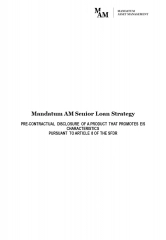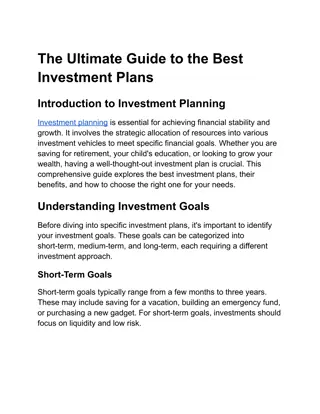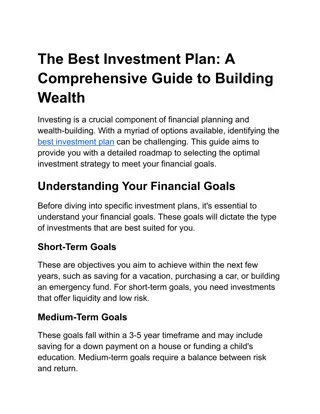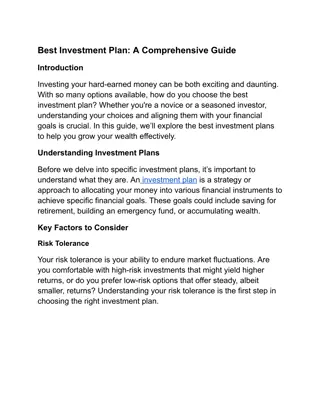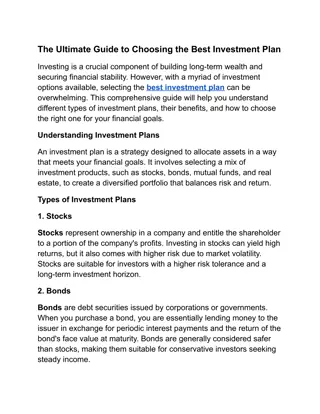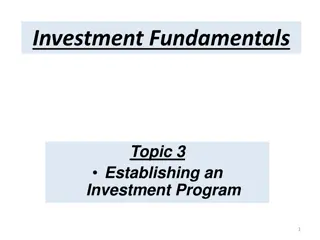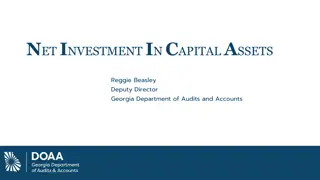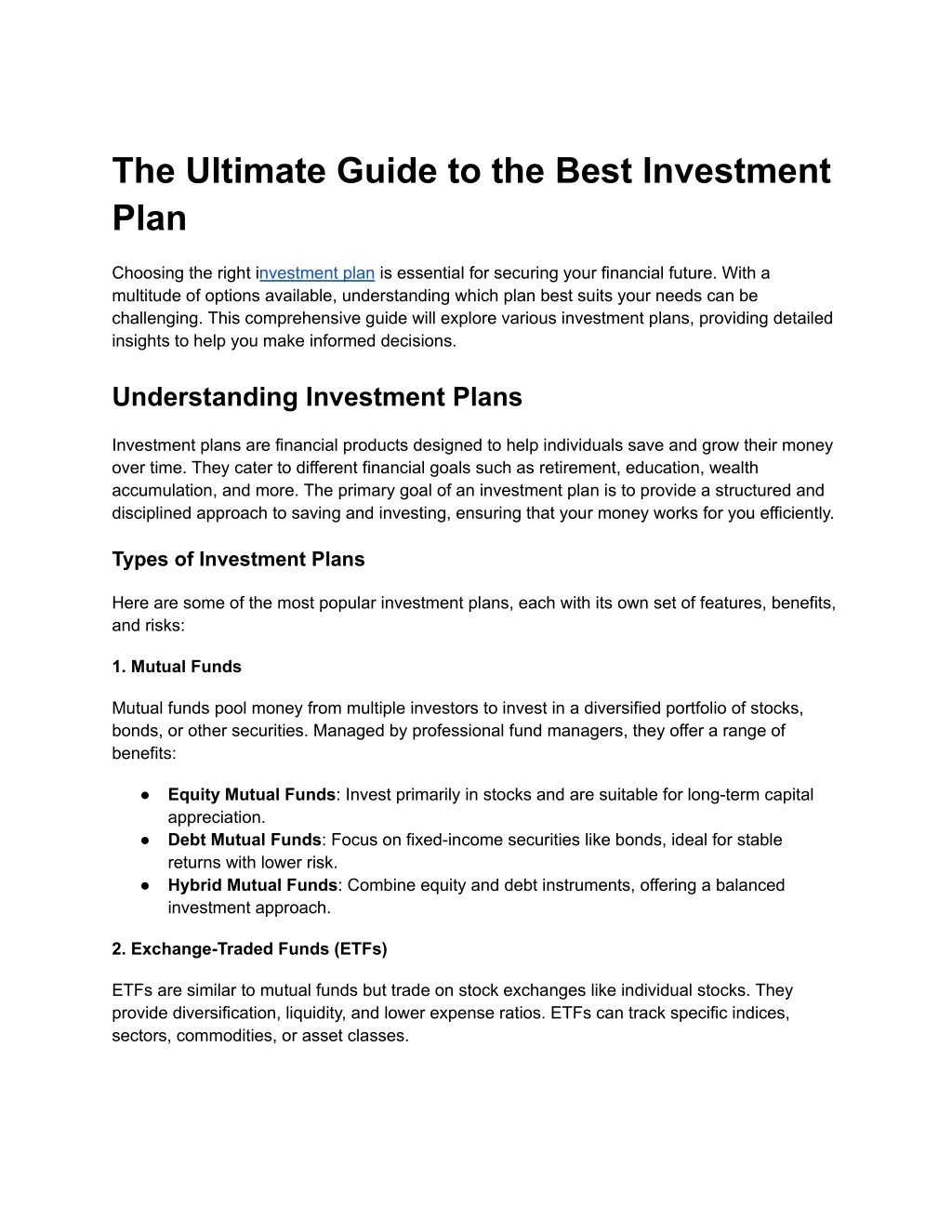
The Ultimate Guide to the Best Investment Plan
Choosing the right investment plan is essential for securing your financial future. With a multitude of options available, understanding which plan best suits your needs can be challenging. This comprehensive guide will explore various investment pla
Uploaded on | 0 Views
Download Presentation

Please find below an Image/Link to download the presentation.
The content on the website is provided AS IS for your information and personal use only. It may not be sold, licensed, or shared on other websites without obtaining consent from the author. Download presentation by click this link. If you encounter any issues during the download, it is possible that the publisher has removed the file from their server.
E N D
Presentation Transcript
The Ultimate Guide to the Best Investment Plan Choosing the right investment plan is essential for securing your financial future. With a multitude of options available, understanding which plan best suits your needs can be challenging. This comprehensive guide will explore various investment plans, providing detailed insights to help you make informed decisions. Understanding Investment Plans Investment plans are financial products designed to help individuals save and grow their money over time. They cater to different financial goals such as retirement, education, wealth accumulation, and more. The primary goal of an investment plan is to provide a structured and disciplined approach to saving and investing, ensuring that your money works for you efficiently. Types of Investment Plans Here are some of the most popular investment plans, each with its own set of features, benefits, and risks: 1. Mutual Funds Mutual funds pool money from multiple investors to invest in a diversified portfolio of stocks, bonds, or other securities. Managed by professional fund managers, they offer a range of benefits: Equity Mutual Funds: Invest primarily in stocks and are suitable for long-term capital appreciation. Debt Mutual Funds: Focus on fixed-income securities like bonds, ideal for stable returns with lower risk. Hybrid Mutual Funds: Combine equity and debt instruments, offering a balanced investment approach. 2. Exchange-Traded Funds (ETFs) ETFs are similar to mutual funds but trade on stock exchanges like individual stocks. They provide diversification, liquidity, and lower expense ratios. ETFs can track specific indices, sectors, commodities, or asset classes.
3. Fixed Deposits (FDs) Fixed deposits are a traditional and safe investment option offered by banks and financial institutions. They provide a fixed rate of return over a specified period, making them ideal for conservative investors seeking guaranteed returns with minimal risk. 4. Public Provident Fund (PPF) PPF is a long-term savings scheme offered by the government, providing tax benefits and attractive interest rates. With a lock-in period of 15 years, it is suitable for long-term goals like retirement. 5. Unit Linked Insurance Plans (ULIPs) ULIPs combine insurance and investment, offering life cover along with investment options in equity, debt, or balanced funds. They provide the dual benefit of protection and wealth creation. 6. Real Estate Investing in real estate involves purchasing property for rental income or capital appreciation. While it can offer substantial returns, it requires significant capital and involves risks like market fluctuations and maintenance costs. 7. Gold and Precious Metals Investing in gold and other precious metals is considered a safe haven during economic uncertainty. Investors can purchase physical gold, gold ETFs, or invest in mining stocks. Factors to Consider When Choosing an Investment Plan Selecting the best investment plan depends on various factors, including your financial goals, risk tolerance, investment horizon, and liquidity needs. Here are some key considerations: 1. Financial Goals Define your financial objectives, such as saving for a child's education, buying a house, or planning for retirement. Your goals will guide you in choosing the most suitable investment plan. 2. Risk Tolerance Evaluate your risk appetite. Higher returns often come with higher risks, so it's crucial to balance your investment portfolio according to your risk tolerance.
3. Investment Horizon Determine your investment time frame. Long-term investments can afford to take on more risk, while short-term investments require safer options. 4. Liquidity Consider the liquidity of your investments. Some plans, like FDs and PPFs, have lock-in periods, whereas others, like mutual funds and ETFs, offer more liquidity. 5. Tax Implications Evaluate the tax benefits and implications of different investment plans. Some plans offer tax deductions, while others might be subject to capital gains tax. Best Investment Plans for Different Financial Goals 1. Retirement Planning For retirement planning, long-term investment plans like PPF, NPS (National Pension System), and equity mutual funds are ideal. These options provide significant growth potential over time and offer tax benefits. 2. Child's Education Investing in child plans, equity mutual funds, and ULIPs can help build a corpus for your child's education. These plans offer a mix of growth potential and financial protection. 3. Wealth Accumulation For wealth accumulation, consider investing in equity mutual funds, real estate, and gold. These options have the potential to deliver high returns over the long term. 4. Tax Savings To save on taxes, look into PPF, ELSS (Equity-Linked Savings Scheme), and tax-saving FDs. These plans offer tax deductions under Section 80C of the Income Tax Act. 5. Short-Term Goals For short-term goals, liquid funds, short-term debt funds, and recurring deposits are suitable. These options provide stable returns with lower risk and high liquidity.
Tips for Successful Investing Diversify Your Portfolio: Spread your investments across different asset classes to minimize risk. Regularly Review Your Portfolio: Periodically review and rebalance your portfolio to align with your financial goals and market conditions. Stay Informed: Keep updated with the latest market trends and economic developments. Avoid Emotional Investing: Base your investment decisions on research and analysis, not emotions. Seek Professional Advice: Consult with a financial advisor to create a customized investment plan tailored to your needs. Investing wisely can help you achieve your financial goals and secure your future. By understanding the various investment options and factors to consider, you can make informed decisions that align with your objectives.

